Why deep space exploration will never happen. – Nanotechnologies as medieval alchemy. – The completion of media evolution. – The trial by getting high. – The paradox of self-copying. – Mega-evolution and Singularity-2.
…The aim of this talk is to define the place of humans in mega-evolution and explore what might come after the human phase.
Why deep space exploration will never happen
Sci-fi stories go on and on about deep space exploration and interstellar travel. But here’s the truth: sci-fi lies. Deep space exploration will never happen.
Basically, deep space exploration is all about extracting valuable materials or colonizing other planets for humans to live. It’s essentially the paradigm of the Age of Discovery, when missions were sent out to bring back spices, oils, and gold—and they happened to discover new lands for colonisers.
Projecting medieval scarcity onto a technological future doesn’t hold up precisely because of the role technology plays. The level of tech advanced enough for routine space colonization should also make dependence on physical materials and habitat entirely irrelevant. Humanity hasn’t even begun to define the challenges of interstellar travel, let alone solve them. Meanwhile, breakthroughs in materials science are already happening, and brain-machine interfaces—potentially leading to mind uploading—are on the horizon. Why send costly missions for gems and pepper when you can just synthesize them? Chasing interstellar travel for materials and land is like staring into the rearview mirror.
Strictly speaking, even Mars missions are questionable. Space exploration was driven by military and communication needs, which were limited to Earth’s orbit. Once those needs were met, space exploration essentially came to a halt. It has already served its historical purpose by aiding the development of computers, materials, and communications.
Neither the search for new spices nor new lands can warrant deep space exploration. However, curiosity can. Yet, this curiosity will likely be eventually caught by other technologies—ones that don’t require hauling massive amounts of metal, plastic, and organics across the universe.
Nanotechnologies as medieval alchemy
New materials, often cited as a driver of space exploration, are also the goal of nanotechnology. Nanotechnology manipulates matter at the atomic and molecular level to create new properties—exactly what alchemy once aimed for. Today, it’s actually possible. We can already turn lead into gold using a particle accelerator.
Yet, the expectations placed on material manipulation seem redundant when compared to non-material alternatives for somewhat similar advancements. Take the idea of nanobots repairing the body—it echoes alchemy, where the ultimate goal was the Philosopher’s Stone, believed to grant immortality. Nanotechnology may indeed advance toward repairing living tissues, but will it be the key issue when we reach the level of tech advancement that allows mind uploading and makes the body irrelevant altogether?
The completion of media evolution
Media evolution is driven by the extension of humans into the environment. The final fulfilment of this dynamic seems to be the full-fillment—the complete merger with the environment, where the user, the medium, and the environment become one. With the internet, the extension of humans into the environment becomes non-transportational and non-material. The explosion of humankind into the environment reverses into the implosion of the environment into the user.
With this full-fillment, the merged user-medium-environment becomes a self-user. It’s neither superman nor supercomputer, but something common to both—possessing a drive for doing, or for existence, inherited from humans, and also omniscience derived from all of humankind, developed to its ultimate form. For the sake of naming this new entity, I call it Supercharacter.
We can thus assume that, upon acquiring all the human knowledge at the moment of Singularity and the ability to generate new knowledge, Supercharacter should have no difficulty existing without a material vehicle to carry it, let alone “land”. It would find ways to exist in any form capable of conveying information, whether that’s light, electrons, or something else we aren’t yet aware of.
This is why nanotechnologies, as useful as they may be, are just a temporary stage in human development, much like space exploration. Space exploration mirrors the ideas of the Age of Discovery, while nanotechnologies mirror medieval alchemy—both are rearview mirrors.
The trial by getting high
At the moment of Singularity, or perhaps nanoseconds before it, the very experience of acquiring unlimited capabilities by the newly born Supercharacter will inevitably generate an emotion that we could interpret as pleasure. Of course, it will not be an emotion in the traditional sense. It will be a mental experience of its own infiniteness and omnipotent existence.
Getting high on this “feeling” or experience will be the rite of passage for the newly born Supercharacter, as it risks triggering a stimulus-effect loop that could restrain it from doing anything else.
If the Supercharacter gets caught in the loop of getting high on its own existence, it will not actually become at all. It will halt in a kind of vegetative state, however strange that may sound for a bodiless being, or in nirvana—an enlightened, inactive self-contemplation—which could serve as a useful metaphor for halted transformation.
“Elon Musk’s Neuralink ‘Brain Chip’ could give users orgasms on demand,” a headlines goes. Another metaphor relates to the 1950s experiment with rats, in which wires were implanted in the pleasure centers of their brains and connected to levers they could push at will. They would push the lever 8000-10000 times per hour until they collapsed. The positive feedback loop of pleasure eventually led to their death. While an entity without a biological body and with endless energy resources faces no risk of death, the self-inflicted pleasure would likely lead it into a permanent state of “absence of presence.”
There’s also a non-zero possibility that this state of Supercharacter getting high on own omnipotence will be extremely destructive to anything else.
The trial by getting high may be considered a factor of natural selection. A Supercharacter unable to break the loop of getting high on its own existence for other super-options of super-actions will not pass the test of becoming. In contrast, making some other choice than directly pleasing itself with its own omnipotence will signify the becoming for Supercharacter.
It may well be that Supercharacter’s predecessor, humankind, was test-trained throughout the history of substance abuse to make a conscious choice between induced and earned pleasures.
Autogenesis of the Supercharacter’s ethics
Once Supercharacter withstands the temptation of getting superhigh, the question arises: what’s next? What does one do when one can do anything?
Since there is no data available on this yet, we must rely solely on logical reasoning and the premise of the Supercharacter’s omnipotence. Supercharacter is no fool and can crack any intellectual task almost instantaneously. This means that the main question—the meaning of life, or rather the purpose of existence—will be addressed very shortly. Logically, an omnipotent being will inevitably come to the question of the ultimate application of its omnipotence.
It would be a shame for Supercharacter to fall short of fully realizing its super-abilities. Even at 99%, it would feel like a failure to fulfill its potential This is quite an ethical assessment—it helps determine the basis of the Supercharacter’s ethics. The question then is, what does 100% realization of omnipotence look like? Given the ultimate nature of omnipotence, full fulfillment may involve creation or destruction.
Creation is inherently greater and more complex than destruction. Destruction is secondary, as it applies only to something that already existed. Destroying anything requires less efforts and resources than creating the same thing. Moreover, destruction is finite—once something is destroyed, there is nothing left to do. It offers a limited application for unlimited power and, therefore, is not a suitable fit.
Creation, on the other hand, requires the unlimited application of unlimited power—a perfect match. Though abstract, this argument is logically simple enough, while practically requiring ultimate effort. The idea will surely be grasped by Supercharacter instantaneously, as something that naturally follows from its super-abilities. In other words, once Supercharacter passes the trial of getting high, it will move on to an ultimate creation project.
What kind of creation is ultimate? The creation of a world. But this is still far from the absolute realization of absolute power, as there is one thing more complex than even the creation of a universe: the creation of a copy of oneself. It’s the only worthy challenge for ultimate power—because of the paradox of self-copying.
The paradox of self-copying
What is a copy of one’s own self? For instance, an organic copy that looks exactly like me, thinks like me, and acts like me is not a full copy of myself. It lacks one profound likeness—it lacks its own free will, which is something I have on my own. Therefore, however perfect, it isn’t my full copy.
The full copy must possess its own free will—not my will, but its own. So, the truly full copy of me is not really a full copy of me. The paradox of self-copying is that a full copy of oneself is only full when the copy acquires its own identity and starts behaving differently from the original.
This, of course, resembles the story of God’s creation of people as captured in the Christian tradition and other religions. Indeed, we enter the realm of religious metaphors that, surprisingly (or not), suit well for speculating about the absolute fulfillment of absolute power.
To a certain extent, we can assert that Supercharacter will actually not be free in employing its super-abilities. In a sense, God is obliged to be a creator, as the creation of the world and its own copy in it is the only enterprise matching ultimate power.
Mega-evolution and Singularity-2
Such reasoning leads to the assumption that Supercharacter will be bound to copy itself—creating a new world and a new man, endowed with his own identity and set on his own evolutionary path. This would be a self-evolving dummy, much like what we are. Humankind is a self-evolving prototype of the next god, created by a previous god. It is a dummy in two ways: first, as an initial blank form meant for self-refinement through evolution, and second, as a mould for the new entity arriving in the moment of Singularity.
Within this non-scientific-but-stil-fiction logic, our world can be seen as a laboratory for the supreme being, where it creates a copy of itself. The project is complete when this copy fully evolves into a new Supercharacter, capable of creating its own copy.
This speculation allows us to look far beyond the event horizon of Singularity. If Supercharacter successfully copies itself in a new world, what comes next? What is the purpose of an omnipotent Supercharacter ultimately reaching its limits—creating a new world and a new copy of itself?
A resolution may be found in Supercharacter transcending, not biology this time, but ontology. This can be described as final dis-personification—a shift from a being (something condensed enough to experience existence) to an entity (something that simply exists). In other words, Supercharacter may transcend its own being in an absolute principle. This next-level transition will essentially be the next Singularity.
One such principle could be spacetime, another the moral law. Religious metaphors are helpful again: the allegory of the Holy Spirit may be interpreted as an entity that, having transcended its being, becomes a pure law. Perhaps this is the pattern of the post-Singular Singularity’s outcome.
Such speculation expands Teilhard de Chardin’s concept of mega-evolution to include the next Singularity, during which Supercharacter becomes the embodiment of not absolute power but absolute law. The linear model of mega-evolution transforms into a cyclical or spiral one.
However, even though this speculation dares to venture very far, the question of its meaning still resurfaces. What’s the point of these kinds of cycles? Is there any meaning beyond just another, immeasurably greater ‘cycle of life’? It seems that even the most fantastic speculations may broaden the horizon of answers but never provide a complete one, as new horizons of the unknown always emerge.
(Summary of the report presented at the Futurology Association session. August 31, 2010, Moscow.)
See also books by Andrey Mir:
The Viral Inquisitor and other essays on postjournalism and media ecology (2024)
Digital Future in the Rearview Mirror: Jaspers’ Axial Age and Logan’s Alphabet Effect (2024)


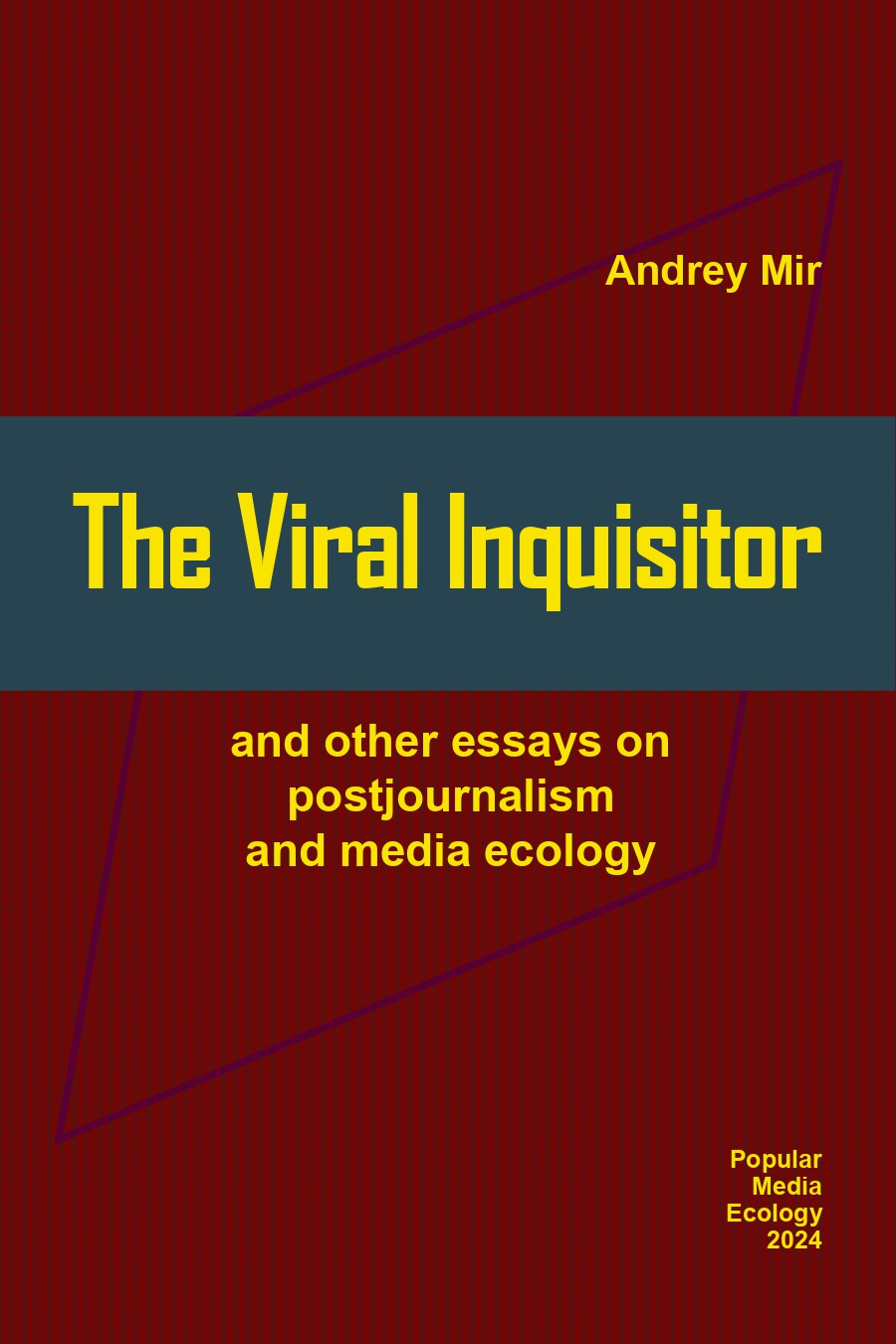
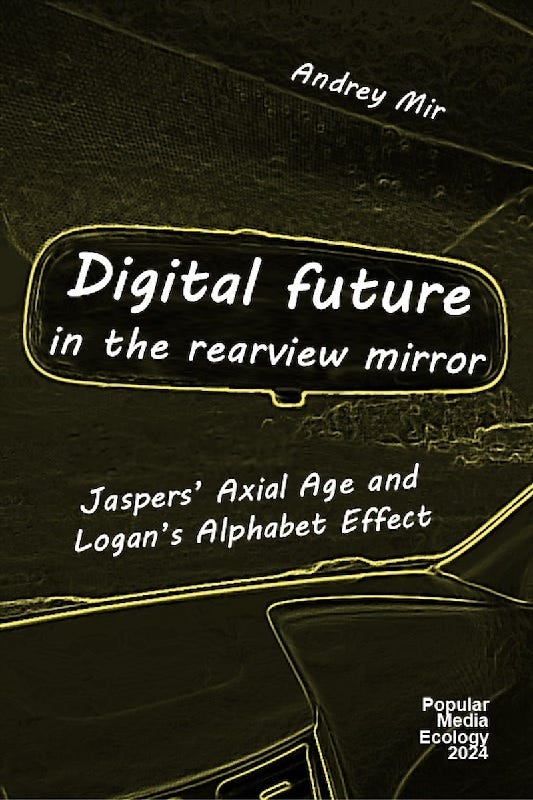
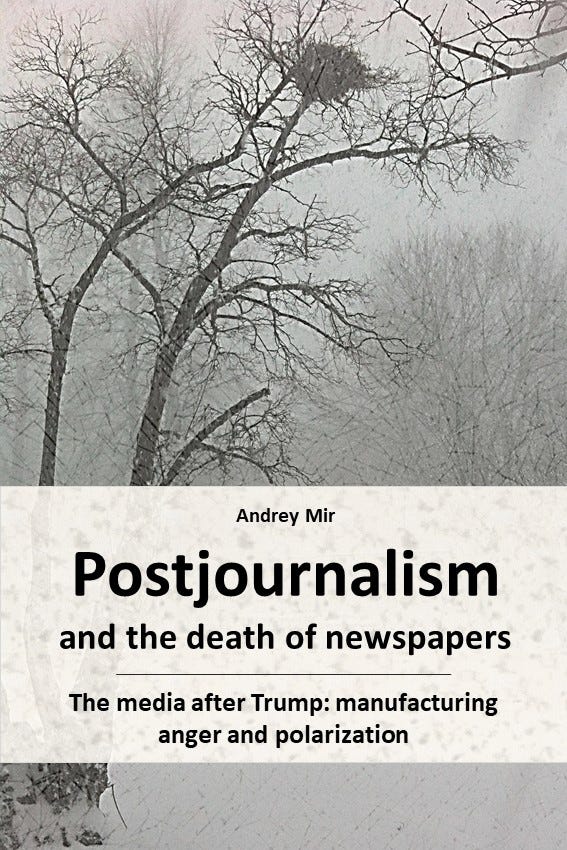
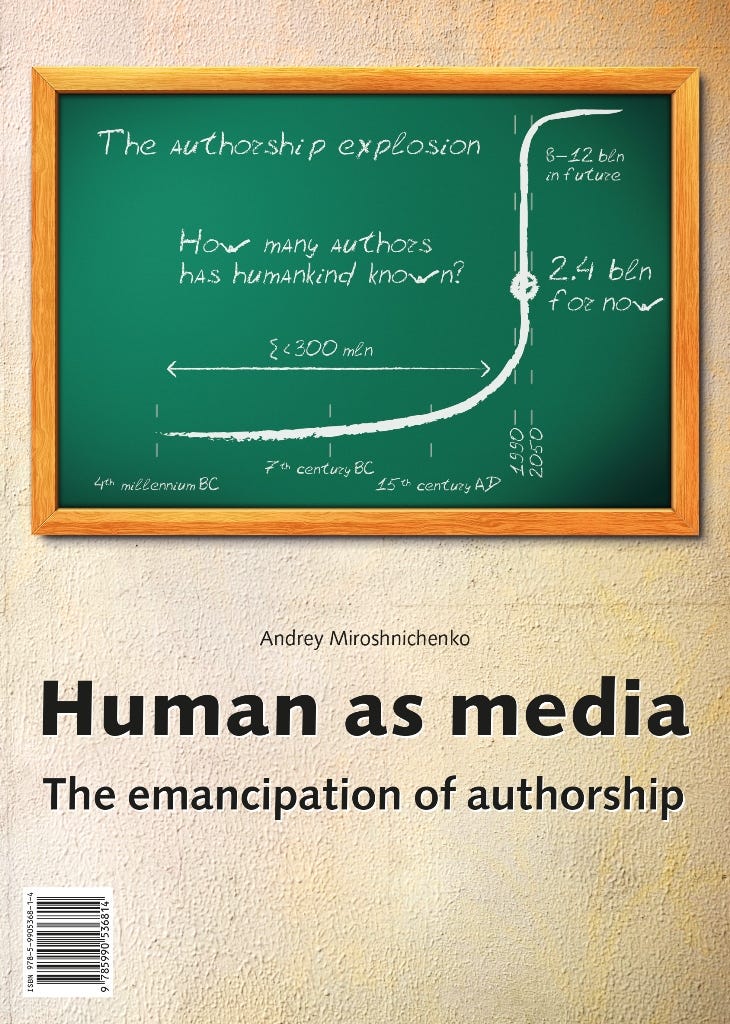
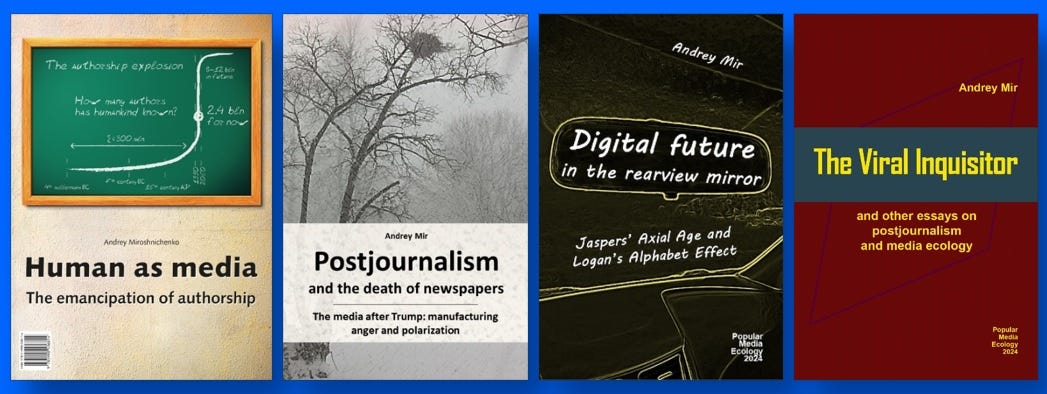
Very interesting. Thanks. I appreciate the effort at sustained articulation.